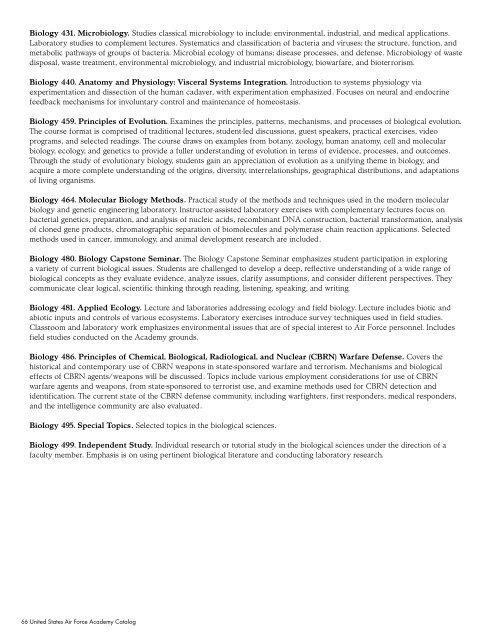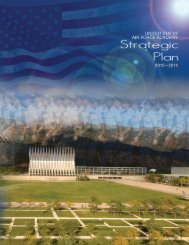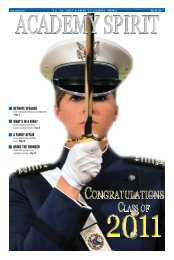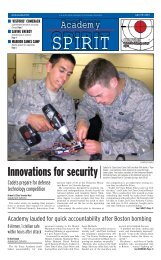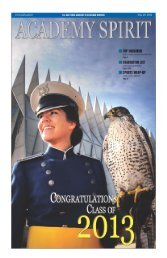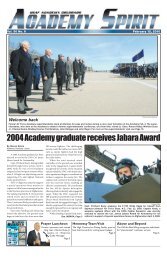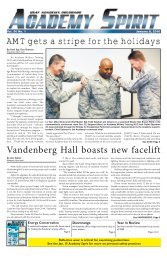2008-2009 Catalog - United States Air Force Academy
2008-2009 Catalog - United States Air Force Academy
2008-2009 Catalog - United States Air Force Academy
You also want an ePaper? Increase the reach of your titles
YUMPU automatically turns print PDFs into web optimized ePapers that Google loves.
Biology 431. Microbiology. Studies classical microbiology to include: environmental, industrial, and medical applications.<br />
Laboratory studies to complement lectures. Systematics and classification of bacteria and viruses; the structure, function, and<br />
metabolic pathways of groups of bacteria. Microbial ecology of humans; disease processes, and defense. Microbiology of waste<br />
disposal, waste treatment, environmental microbiology, and industrial microbiology, biowarfare, and bioterrorism.<br />
Biology 440. Anatomy and Physiology: Visceral Systems Integration. Introduction to systems physiology via<br />
experimentation and dissection of the human cadaver, with experimentation emphasized. Focuses on neural and endocrine<br />
feedback mechanisms for involuntary control and maintenance of homeostasis.<br />
Biology 459. Principles of Evolution. Examines the principles, patterns, mechanisms, and processes of biological evolution.<br />
The course format is comprised of traditional lectures, student-led discussions, guest speakers, practical exercises, video<br />
programs, and selected readings. The course draws on examples from botany, zoology, human anatomy, cell and molecular<br />
biology, ecology, and genetics to provide a fuller understanding of evolution in terms of evidence, processes, and outcomes.<br />
Through the study of evolutionary biology, students gain an appreciation of evolution as a unifying theme in biology, and<br />
acquire a more complete understanding of the origins, diversity, interrelationships, geographical distributions, and adaptations<br />
of living organisms.<br />
Biology 464. Molecular Biology Methods. Practical study of the methods and techniques used in the modern molecular<br />
biology and genetic engineering laboratory. Instructor-assisted laboratory exercises with complementary lectures focus on<br />
bacterial genetics, preparation, and analysis of nucleic acids, recombinant DNA construction, bacterial transformation, analysis<br />
of cloned gene products, chromatographic separation of biomolecules and polymerase chain reaction applications. Selected<br />
methods used in cancer, immunology, and animal development research are included.<br />
Biology 480. Biology Capstone Seminar. The Biology Capstone Seminar emphasizes student participation in exploring<br />
a variety of current biological issues. Students are challenged to develop a deep, reflective understanding of a wide range of<br />
biological concepts as they evaluate evidence, analyze issues, clarify assumptions, and consider different perspectives. They<br />
communicate clear logical, scientific thinking through reading, listening, speaking, and writing.<br />
Biology 481. Applied Ecology. Lecture and laboratories addressing ecology and field biology. Lecture includes biotic and<br />
abiotic inputs and controls of various ecosystems. Laboratory exercises introduce survey techniques used in field studies.<br />
Classroom and laboratory work emphasizes environmental issues that are of special interest to <strong>Air</strong> <strong>Force</strong> personnel. Includes<br />
field studies conducted on the <strong>Academy</strong> grounds.<br />
Biology 486. Principles of Chemical, Biological, Radiological, and Nuclear (CBRN) Warfare Defense. Covers the<br />
historical and contemporary use of CBRN weapons in state-sponsored warfare and terrorism. Mechanisms and biological<br />
effects of CBRN agents/weapons will be discussed. Topics include various employment considerations for use of CBRN<br />
warfare agents and weapons, from state-sponsored to terrorist use, and examine methods used for CBRN detection and<br />
identification. The current state of the CBRN defense community, including warfighters, first responders, medical responders,<br />
and the intelligence community are also evaluated.<br />
Biology 495. Special Topics. Selected topics in the biological sciences.<br />
Biology 499. Independent Study. Individual research or tutorial study in the biological sciences under the direction of a<br />
faculty member. Emphasis is on using pertinent biological literature and conducting laboratory research.<br />
66 <strong>United</strong> <strong>States</strong> <strong>Air</strong> <strong>Force</strong> <strong>Academy</strong> <strong>Catalog</strong>


